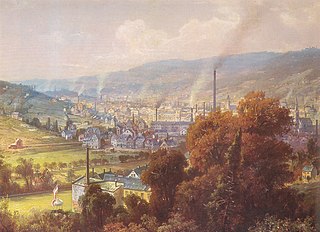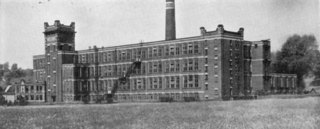Related Research Articles

Muslin is a cotton fabric of plain weave. It is made in a wide range of weights from delicate sheers to coarse sheeting. It is commonly believed that it gets its name from the city of Mosul, Iraq.

Crespi d'Adda is a village in northern Italy and hamlet (frazione) of Capriate San Gervasio, a municipality in the province of Bergamo, Lombardy. It is a historic settlement and an outstanding example of the 19th and early 20th-century "company towns" built in Europe and North America by enlightened industrialists to meet the workers' needs. The site is still intact and is partly used for industrial purposes, although changing economic and social conditions now threaten its survival. Since 1995 it has been on UNESCO's list of World Heritage Sites.

Textile manufacture during the British Industrial Revolution was centred in south Lancashire and the towns on both sides of the Pennines in the United Kingdom. The main drivers of the Industrial Revolution were textile manufacturing, iron founding, steam power, oil drilling, the discovery of electricity and its many industrial applications, the telegraph and many others. Railroads, steamboats, the telegraph and other innovations massively increased worker productivity and raised standards of living by greatly reducing time spent during travel, transportation and communications.

The textile industry is primarily concerned with the design, production and distribution of textiles: yarn, cloth and clothing.

Barrowford is a village and civil parish in the Pendle district of Lancashire, England, north of Nelson, near the Forest of Bowland Area of Outstanding Natural Beauty.

Gallarate is a city and comune of Alto Milanese of Lombardy and of Milan metropolitan area, northern Italy, in the Province of Varese. It has a population of some 54,000 people.

Theater drapes and stage curtains are large pieces of cloth that are designed to mask backstage areas of a theater from spectators. They are designed for a variety of specific purposes, moving in different ways and constructed from various fabrics. Many are made from black or other darkly colored, light-absorbing material. Theater drapes represent a portion of any production's soft goods, a category comprising any non-wardrobe, cloth-based element of the stage or scenery. Theater curtains are often pocketed at the bottom to hold weighty chain or to accept pipes to remove their fullness and stretch them tight.
Peroni may refer to:
Missoni is an Italian luxury fashion house based in Varese, and known for its colourful knitwear designs. The company was founded by Ottavio ("Tai") and Rosita Missoni in 1953.

Ansaldo was one of Italy's oldest and most important engineering companies, existing for 140 years from 1853 to 1993.
Ventile, is a registered trademark used to brand a special high-quality woven cotton fabric first developed by scientists at the Shirley Institute in Manchester, England. Originally created to overcome a shortage of flax used for fire hoses and water buckets, its properties were also useful for pilots' immersion suits, but expensive and leaky if exposed to sweat or oils.

Welkin Mill, Lower Bredbury is a cotton spinning mill in Lower Bredbury/Portwood, Stockport, Greater Manchester. It was built in the early years of the 20th century for ring spinning. It was taken over by the Lancashire Cotton Corporation in the 1930s and passed to Courtaulds in 1964. Production ended in 1967. The 162,000 sq ft (15,100 m2), four-storey mill occupies a 5.15 acres (2.08 ha) site on Welkin Road.

Monton Mill was a cotton spinning mill in Eccles, Greater Manchester, England, built in 1906. It was taken over by the Lancashire Cotton Corporation in the 1930s and passed to Courtaulds in 1964. After production ended, it was demolished and replaced with housing; its name is preserved in the street name.

Kingston Mill, Stockport is a mid nineteenth century cotton spinning mill in Edgeley, Stockport, Greater Manchester, England. It was taken over by the Lancashire Cotton Corporation in the 1930s and passed to Courtaulds in 1964. Production finished, it was made over to multiple uses.

Harle Syke is a small village within the parish of Briercliffe, situated three miles north of Burnley, Lancashire, England. It was the home to eleven weaving firms, working out of seven mills. Queen Street Mill closed in 1982, and was converted to a textile museum, preserving it as a working mill. It is the world's last 19th-century steam powered weaving mill.
The textile industry in India, traditionally after agriculture, is the only industry in the country that has generated large-scale employment for both skilled and unskilled labour. The textile industry continues to be the second-largest employment generating sector in India. It offers direct employment to over 35 million people in the country. India is the world's second largest exporter of textiles and clothing, and in the fiscal year 2022, the exports stood at US$44.4 billion. According to the Ministry of Textiles, the share of textiles in total exports during April–July 2010 was 11.04%. During 2009–2010, the Indian textile industry was pegged at US$55 billion, 64% of which services domestic demand. In 2010, there were 2,500 textile weaving factories and 4,135 textile finishing factories in all of India. According to AT Kearney’s ‘Retail Apparel Index’, India was ranked as the fourth most promising market for apparel retailers in 2009.

The Museum of Textiles and Industry is one of the two museums in Busto Arsizio, Italy, that specialises in spinning and weaving. It was opened in 1997 to house objects, pictures and archive material representing Busto Arsizio's industrial history.
The textile industry in China is the largest in the world in both overall production and exports. China exported $274 billion in textiles in 2013, a volume that was nearly seven times that of Bangladesh, the second largest exporter with $40 billion in exports. This accounted for 43.1% of global clothing exports. According to Women's Wear Daily, they account for more than 50 percent of the world's total overall production, exports, and retail. As of 2022, their textile and garment exports total up to around $316 billion and their retail up to $672 billion. China has been ranked as the world's largest manufacturer since 2010.

The Game of Thrones Tapestry is a hand-crafted tapestry, woven by hand on a jacquard loom, with additional embroidery. The tapestry tells the entire story of the television show, Game of Thrones. It consists of seven 11-metre-long panels and one 10.5-metre panel. The eight panels depict scenes from each episode and include images of crew at work. The tapestry was commissioned by HBO and Tourism Ireland, the tourism bureau of Northern Ireland where HBO filmed much of the series.
Lombard pre-unitarian industry refers to the characteristics and development of industry in the Lombard provinces from its founding to the Unification of Italy. Industry in Lombardy was born and developed from the early 19th century largely on private initiative, as opposed to elsewhere where industry was encouraged by the various governments through direct intervention or massive state orders. This feature, together with the lack of a favorable customs and industrial policy under the dependencies of the Austrian Empire, on which Lombardy depended, allowed local industry to strengthen over the years until it led Italian industrial development with the Unification of Italy.